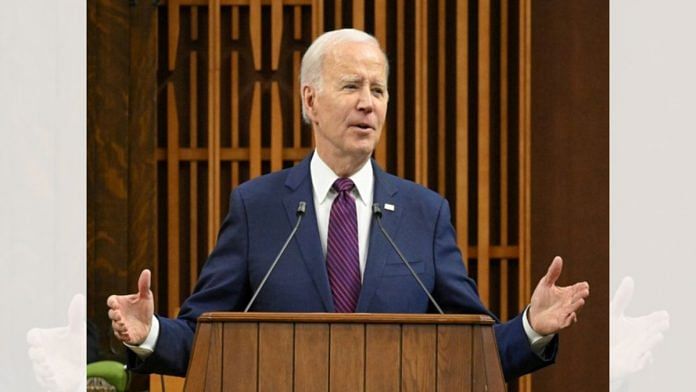Thank you dear subscribers, we are overwhelmed with your response.
Your Turn is a unique section from ThePrint featuring points of view from its subscribers. If you are a subscriber, have a point of view, please send it to us. If not, do subscribe here: https://theprint.in/subscribe/
While addressing the opening event of the Asian American, Native Hawaiian, and Pacific Islander Heritage Month, US President Joe Biden remarked that India, China, Russia, and Japan are having trouble because they are xenophobic. “Why is China stalling so badly economically, why is Japan having trouble, why is Russia, why is India, because they’re xenophobic. They don’t want immigrants. Immigrants are what makes us strong” he said
This categorization was quickly denounced by its long-time ally Japan. As reported by Al Jazeera, its embassy in Washington, DC, described this statement as “unfortunate” and “not based on an accurate understanding of Japan’s policies”. In India, External Affairs Minister S Jaishankar retorted, “India has always been a very unique country… I would say actually, in the history of the world, that it’s been a society which has been very open… different people from different societies come to India.”
To clear the air, press secretary Karine Jean-Pierre said: “He was saying that when it comes to who we are as a nation, we are a nation of immigrants, that is in our DNA”(4) and this comment by the US President will not hamper the larger strategic goals between the US and its allies.
Let’s not perceive President Biden’s comment as just a broad, off-the-cuff statement, but rather as both an idea and a myth that sustain, enliven, and endure the nation of the United States of America, even before its liberation from the British Crown. In his bestselling and Pulitzer Prize-winning work, The End of the Myth, Historian Greg Gardin argues that even before its independence in the year 1776, America was always imagined by its founding fathers as a land of endless possibilities, belief in exceptionalism ingrained with ‘democratic, individualistic and forward-looking values’ until Trump built the border wall symbolizing the end of the myth.(5)Borrowing Frederick Turner’s ‘frontier thesis’, Greg writes that The US is the only country where the idea of ‘an open frontier’ is prominent since frontiers can be redrawn, reimagined, and integrated into the nation, while borders cannot be since borders are always demarcated and permanent.
“So vast is the territory of North America that it will require many ages to settle fully” wrote Benjamin Franklin in 1751 anticipating a million Englishmen double the size of Great Britain.
When President Andrew Jackson spoke of ‘extending the area of freedom’ he was lending credence to the belief in “Manifest Destiny”. But this idea came with a cost- racial segregation, stark wealth inequality, excessive power of corporations, and other issues that bequeathed the nation were never addressed. Greg notes that while Frederick Turner was formulating and exulting the notion of the ‘frontier thesis’ through its biblical connotations in 1893, inhumane treatment was meted out to the black population and Mexicans were being lynched by Anglo-Texan vigilantes in a period remembered as La Matanza(The Massacre).
Not to mention the exploitation of Native Americans. In A Century of Dishonor(1881) Henley Hunt Jackson meticulously notes the inhumane and cruel manner in which the land of seven native tribes was appropriated and massacred. Another landmark yet sobering work Bury My Heart at Wounded Knee: An Indian History of American West by Dee Brown also covers the atrocities committed by the westward expansion of White and the forced displacement of native tribes like Navajo, Santee Dakota, Hunkpapa Lakota, Oglala Lakota, Cheyenne, and Apache.
Tragically, in 2020 the border wall was finishing its construction by defiling the land of the Tohono Oʼodham people.
Post World World II, the ‘frontier’ became a pivotal idea that propelled a vision to remake the world order. As John Ikenberry’s After Victory (2001) showed, the formation of institutions like the United Nations, NATO, Bretton Wood twins, and GATT gave the US a definite set of powers to reorder the structure of international politics. But this institutionalization, paradoxically, created a rule-based, more representative, and liberal power system that constrained the hegemony of the dominant player. But as Noam Chomsky pointed out, this hegemony of the US policy establishment gave them the fuel to initiate military adventurism in Vietnam, Cambodia, and the jungles of Nicaragua. Not to mention the neocon led movement headed by Dick Cheney and Donald Rumsfield that toppled the Saddam Husein regime in Iraq, eventually distablized the whole Middle East. Other than draining its exchequer, America’s longest war in Afganistan and its subsquent withdrawal and Taliban takeover symbolised its limits on remaking the world.
Despite its pronounced contradictions, the USA is the “most powerful nation in the world” with a high livability index and mostly contented population. And in general,the US and its Western allies’ allure still beckons people around the world. Mortgaging their property, people from as far as India, China are traversing through the forests of central america to reach the land of freedom and opportunity; and this allure will still persist for sometime more.
These pieces are being published as they have been received – they have not been edited/fact-checked by ThePrint

